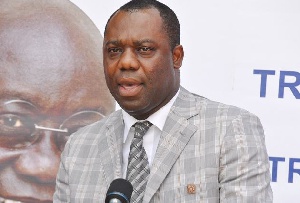As part of the broader educational reforms, Government has rolled-out an educational transformational mechanism by raising the entry requirements for basic school teachers so that they are equivalent to those of other professions.
“From October this year all new entrants to the teaching profession will be required to study Bachelors of Education degrees offered by Colleges of Education, initially in affiliation with the University of Cape Coast and after one year of implementation with other public Universities.
“It is important to note that these changes in teacher education reform are just one element in the Government’s education reform strategy. Alongside the introduction of a new Bachelors of Education degree there will be a new Basic Education Curriculum in Ghana’s schools.
“The curriculum offered in these Colleges of Education will represent a significant departure from previous practice,” Mr Robbin Todd, Team Leader of Transforming Teacher Education and Learning (T-TEL) programme disclosed at the T-TEL Challenge Fund End of Project Learning Event at Koforidua.
The other five public universities to be affiliated to the programme include University of Cape Coast, University of Education Winneba, University of Ghana, Kwame Nkrumah University of Science and Technology, and the University of Development Studies.
Mr Todd said the universities have designed the new Bachelors of Education degrees aligned with the National Teachers’ Standards (NTS) and the National Teacher Education Curriculum Framework (NTECF) and have submitted these to the National Accreditation Board (NAB) for certification.
He said “aligning the new Curriculum with these Standards will ensure that we train the teachers which Ghana needs to deliver a world class education system”.
The T-TEL Team Leader, explained that the Curriculum will be very practically focused- with 30 per cent of the total assessment marks being related to practical assessments of teaching ability- and will focus on ensuring that teachers were confident in the use of learner-centred approaches to encourage critical thinking and problem solving.
He said teaching practice in schools (‘supported teaching’ in the language of the new curriculum) will play a central part in the learning process with student teachers spending time in partner schools in Years one, two, three and four- not just in Year three as is the case with the current Diploma.
“Once student teachers have completed their four-year Bachelors of Education degree they will then spend one year teaching in basic schools, employed by Ghana Education Service, before they will receive their License to practice and achieve qualified teacher status.
“This License is important because it provides an independent validation that each teacher has the practical skills and capabilities to meet the requirements of the National Teachers’ Standards.
“An assessment across the three ‘domains’ of effective teaching which - Professional Values and Attitudes; Professional Knowledge; and Professional Practice,” he said.
Mr Todd explained that Licensing will be practically focused. “It will involve observation of the teacher in the classroom and an assessment of their professional portfolio, lesson plans and other necessary documents.
“And Licensing is not something that should be feared by any aspiring young teacher. It is something which should be embraced, with confidence, as it provides validation that one has met the standards of a professional teacher, an important step in raising the status of the profession,” he said.
He said T-TEL and Government have been working with the National Council for Tertiary Education (NCTE) to support all 46 Colleges of Education to transform teacher education and learning.
“We have been working with Colleges for the past three years to prepare them for the Teacher Education Reforms, and I would also like to recognize and pay tribute to the important role that the University of Cape Coast have been playing in building capacity and capability in Colleges of Education.
“I firmly believe that, with this support, all Colleges are ready to deliver the new Bachelors of Education degree. I am excited about the opportunities for Colleges and Universities, working in a partnership of mutual cooperation, respect and understanding, to truly transform teacher education and learning.
“If Ghana achieves these reforms it will stand as a beacon of hope to all of Africa that genuine change in teacher education is possible,” he said.
He said T-TEL will be there every step of the way, to support the Colleges and Universities over the coming years, “We will work with Universities to provide Continuous Professional Development support to enable all lecturers and tutors to understand all aspects of the new curriculum and deliver it effectively.
“We will seek to strengthen partnerships between partner schools and Colleges, guided by a new School Partnerships Policy- to ensure that experienced teachers are effectively mentoring student teacher in line with the NTS.
“We will provide support to all Colleges to enable them to upgrade the qualifications of their tutors, within a four year transitional period, to meet the minimum requirements of the National Council for Tertiary Education (NCTE).
“We will continue to support Colleges to achieve their organisational objectives and development plans through a Payment By Results (PBR) approach, providing funding for Colleges to use as they see fit to improve their infrastructure and learning environment.
“And we will continue to emphasise the importance of Gender and Inclusion- ensuring that opportunities for advancement are available for all in an inclusive and supportive learning environment”.
Presentations are expected from Peki College of Education, Presbyterian College of Education – Akropong Akuapem, Jasikan College of Education, Presbyterian Women’s College of Education - Aburi Akwapim, SDA College of Education, St. Theresa’s College of Education, Agogo College of Education, Dambai College of Education, and Akatsi College of Education.
General News of Friday, 13 July 2018
Source: ghananewsagency.org













